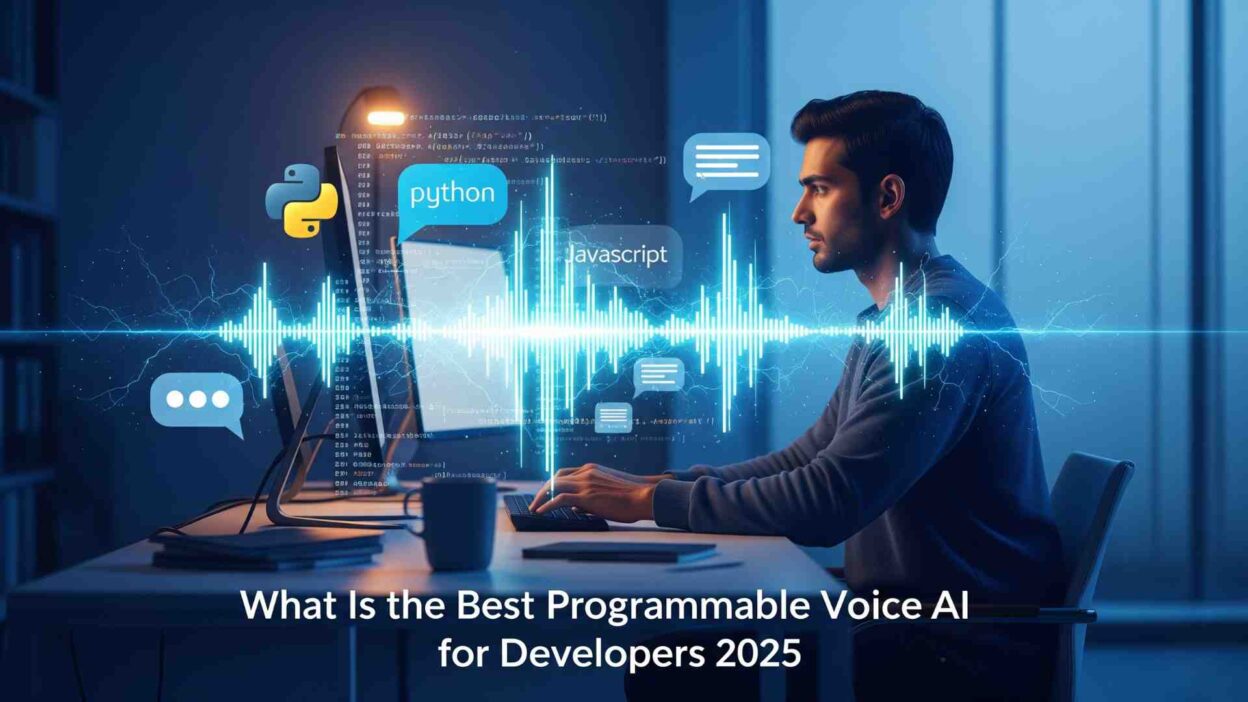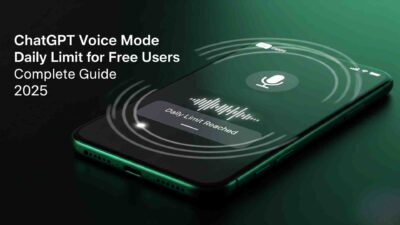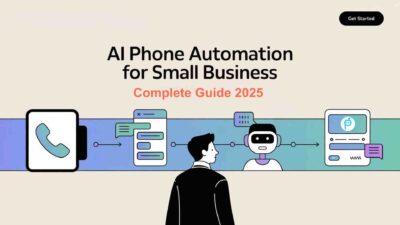TL;DR What is the best programmable voice AI for developers looking to integrate advanced speech synthesis into their applications? Modern developers need reliable, scalable voice AI solutions that deliver consistent performance without breaking the budget.
Table of Contents
Voice AI technology has transformed how applications communicate with users. Developers can now embed human-like speech capabilities directly into their software products. The challenge lies in choosing the right platform among dozens of available options.
Understanding Programmable Voice AI Technology
What is the best programmable voice AI for developers depends on your specific technical requirements. Programmable voice AI refers to speech synthesis platforms that developers can integrate through APIs and SDKs.
These systems convert text into natural-sounding speech using neural networks. Advanced platforms offer voice cloning, emotion control, and multi-language support. The best solutions provide consistent output quality and reliable uptime.
Key Features Developers Need
Modern voice AI platforms must deliver specific capabilities for developer success:
API Quality and Documentation
- Comprehensive REST APIs with clear documentation
- SDK support for popular programming languages
- Webhook capabilities for real-time processing
- Rate limiting information and error handling guides
Voice Quality Standards
- Neural voice synthesis for natural sound
- Multiple accent and language options
- Consistent audio output across different text inputs
- Customizable voice parameters like speed and pitch
Technical Performance
- Low-latency processing for real-time applications
- High uptime guarantees with SLA commitments
- Scalable infrastructure handling traffic spikes
- Efficient caching mechanisms for repeated requests
Top Programmable Voice AI Platforms for Developers
1. Amazon Polly
Amazon Polly leads enterprise voice AI with robust infrastructure and extensive language support. The platform offers 60+ voices across 29 languages with consistent quality.
Developer Benefits:
- Comprehensive AWS ecosystem integration
- SSML support for pronunciation control
- Neural voices with natural breathing patterns
- Predictable pricing at $4 per million characters
Technical Specifications:
- REST API with detailed documentation
- SDKs for Python, Java, Node.js, and .NET
- Real-time streaming capabilities
- 99.9% uptime SLA
Best For: Enterprise applications requiring high reliability and AWS integration.
2. Google Cloud Text-to-Speech
Google’s platform excels in multilingual applications with 380+ voices across 50+ languages. WaveNet technology produces highly natural speech output.
Developer Advantages:
- Advanced neural voice models
- Custom voice creation capabilities
- SSML markup for fine control
- Integration with Google Cloud services
Technical Features:
- gRPC and REST API support
- Client libraries for major programming languages
- Audio format options including MP3 and WAV
- Pay-as-you-go pricing model
Best For: Applications requiring extensive multilingual support and custom voice creation.
3. Microsoft Azure Cognitive Services Speech
Azure Speech Services provides powerful voice synthesis with strong enterprise features. The platform offers 270+ voices across 119 languages.
Development Features:
- Neural voice technology for realistic output
- Custom voice model training
- SSML and Speech SDK support
- Visual Studio integration
Technical Capabilities:
- Real-time synthesis for interactive applications
- Batch processing for large content volumes
- WebSocket connections for streaming
- Flexible pricing tiers
Best For: Microsoft ecosystem applications and custom voice model requirements.
4. ElevenLabs
ElevenLabs revolutionizes voice AI with advanced voice cloning and emotional expression capabilities. The platform targets content creators and developers needing premium voice quality.
Unique Advantages:
- State-of-the-art voice cloning technology
- Emotional tone control and adjustment
- High-quality neural voice synthesis
- Developer-friendly API design
Technical Specifications:
- RESTful API with Python and JavaScript SDKs
- Real-time voice generation capabilities
- Multiple audio format support
- Usage-based pricing model
Best For: Applications requiring premium voice quality and emotional expression.
5. PreCallAI – Specialized Business Communication
What is the best programmable voice AI for developers building communication applications? PreCallAI specializes in business voice automation with transparent pricing and reliable performance.
Business-Focused Features:
- 97% humanized voice quality
- Volume-based pricing starting at ₹6/min ($0.07/minute)
- TRAI compliance for Indian markets
- TrueCaller integration capabilities
Developer Benefits:
- Simple API integration
- Dedicated customer support
- Consistent voice output quality
- Transparent cost structure
Best For: Business communication applications and call automation systems.
Choosing the Right Platform for Your Project
Consider Your Application Type
Real-Time Applications: Interactive applications need low-latency voice generation. Amazon Polly and Google Cloud Text-to-Speech excel in real-time scenarios with streaming capabilities.
Content Creation Tools: Applications generating audio content benefit from high voice quality. ElevenLabs provides superior voice cloning and emotional expression features.
Business Communication Systems: Enterprise communication applications require reliability and compliance. PreCallAI offers specialized business features with transparent pricing models.
Mobile Applications: Mobile apps need efficient voice processing with offline capabilities. Google and Microsoft provide robust mobile SDKs with caching features.
Evaluate Technical Requirements
Integration Complexity: Simple REST APIs reduce development time. Amazon Polly and Google Cloud offer comprehensive documentation and multiple SDK options.
Scalability Needs: High-traffic applications require robust infrastructure. AWS and Google Cloud provide enterprise-grade scaling capabilities.
Cost Considerations: Pricing models vary significantly across platforms. What is the best programmable voice AI for developers with budget constraints? Compare per-character costs versus volume-based pricing.
Voice Quality Standards: Premium applications need neural voice synthesis. All major platforms now offer neural voices, but quality varies by language and accent.
Implementation Best Practices
API Integration Strategies
Error Handling: Implement comprehensive error handling for voice generation failures. Network issues and service limits can interrupt voice processing.
Caching Mechanisms: Cache generated audio files to reduce API calls and improve response times. Store frequently used phrases and common responses locally.
Rate Limiting Management: Monitor API usage to avoid rate-limiting penalties. Implement queuing systems for high-volume voice generation requirements.
Audio Format Optimization: Choose appropriate audio formats for your use case. MP3 provides good compression for streaming, while WAV offers higher quality for processing.
Performance Optimization
Asynchronous Processing: Use asynchronous voice generation for a better user experience. Generate audio in the background while displaying loading indicators.
Batch Processing: Process multiple text inputs simultaneously to improve efficiency. Batch APIs reduce overhead and improve throughput.
Content Preprocessing: Clean and format text before sending to voice APIs. Remove special characters and normalize formatting for consistent output.
Quality Monitoring: Implement monitoring systems to track voice generation success rates and audio quality metrics.
Cost Analysis and ROI Considerations
Pricing Model Comparison
Per-Character Pricing: Amazon Polly charges $4 per million characters. Google Cloud uses similar per-character pricing with volume discounts.
Per-Minute Pricing: PreCallAI offers transparent per-minute pricing at ₹6-14/min ($0.07-0.16/minute). This model works better for longer audio content.
Subscription Models: Some platforms offer monthly subscription plans with included usage quotas. Evaluate based on your expected volume requirements.
Hidden Costs: Factor in development time, API integration costs, and potential overages. Some platforms charge extra for premium voices or advanced features.
ROI Calculation Framework
Development Cost Savings: Voice AI reduces development time compared to custom speech synthesis solutions. Calculate time savings at developer’s hourly rates.
Operational Efficiency: Automated voice generation eliminates manual audio recording and editing costs. Measure efficiency gains in content production workflows.
User Experience Improvements: Better voice quality leads to improved user engagement and retention. Track metrics like session duration and user satisfaction scores.
Scalability Benefits: Cloud-based voice AI scales automatically without infrastructure investments. Compare costs to maintaining internal voice processing capabilities.
Security and Compliance Considerations
Data Privacy Requirements
Text Data Handling: Understand how platforms process and store input text. Some applications require on-premises processing for sensitive content.
Audio File Storage: Review audio file retention policies and deletion procedures. Ensure compliance with data protection regulations.
API Security: Implement proper authentication and authorization for voice API access. Use API keys securely and rotate them regularly.
Compliance Standards: Verify platform compliance with relevant industry standards. Healthcare and financial applications may require specific certifications.
Enterprise Security Features
Encryption Standards: Ensure all API communications use TLS encryption. Verify encryption at rest for stored audio files.
Access Controls: Implement role-based access controls for voice API usage. Monitor and audit API access patterns.
Audit Logging: Maintain detailed logs of voice generation requests and usage patterns. Enable compliance reporting and security monitoring.
Business Continuity: Plan for service disruptions with backup voice AI providers. Test failover procedures and data recovery processes.
Future Trends in Programmable Voice AI
Emerging Technologies
Real-Time Voice Conversion: Live voice transformation during conversations will enable new interactive applications. This technology will revolutionize customer service and communication tools.
Emotional Intelligence Integration: Advanced emotional analysis will enable context-aware voice generation. Applications will adapt voice tone based on user sentiment and interaction history.
Multi-Modal AI Integration: Voice AI will combine with visual and text processing for comprehensive communication solutions. This integration will create more natural user interfaces.
Edge Computing Deployment: Local voice processing will reduce latency and improve privacy. Mobile and IoT applications will benefit from offline voice generation capabilities.
Market Evolution Predictions
Increased Competition: More players will enter the voice AI market, driving innovation and reducing costs. Developers will benefit from improved features and competitive pricing.
Standardization Efforts: Industry standards for voice AI APIs will simplify integration across platforms. Developers will gain more flexibility in choosing and switching providers.
Quality Improvements: Neural voice synthesis will continue improving, approaching indistinguishable human quality. This advancement will expand voice AI applications.
Democratization of Technology: Advanced voice AI features will become accessible to smaller developers and startups. Open-source alternatives will provide cost-effective options.
Read More: Voice Bot Consent Management: Build Legal Customer Databases
Conclusion

What is the best programmable voice AI for developers in 2025? The answer depends on your specific requirements, technical constraints, and budget considerations.
Amazon Polly and Google Cloud Text-to-Speech provide enterprise-grade reliability with comprehensive language support. These platforms excel for high-scale applications requiring consistent performance.
ElevenLabs offers cutting-edge voice quality with advanced cloning capabilities. This platform suits applications where premium voice quality justifies higher costs.
Microsoft Azure Speech Services integrates well with existing Microsoft ecosystems. The platform provides strong enterprise features and custom voice training capabilities.
PreCallAI specializes in business communication with transparent pricing and dedicated support. This platform works well for communication applications requiring reliability and compliance.
Choose your voice AI platform based on technical requirements, integration complexity, cost structure, and long-term scalability needs. Test multiple platforms with your specific use cases before making final decisions.
The voice AI landscape continues evolving rapidly. Stay informed about new features, pricing changes, and emerging alternatives to maintain competitive advantages in your applications.




